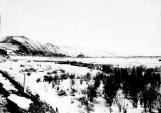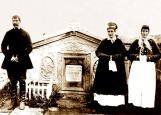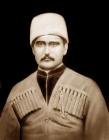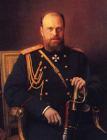14
Lukeria Kalmykova agreed to help the war effort and no Doukhobor had to bear arms. In return, the Doukhobors were paid handsomely for their services and again, the community prospered which contributed to their 'golden years'. But this agreement was reported to have haunted Lukeria for having conceded to the authorities and for having aided a war effort.16
In 1882, Lukeria beckoned a young man of 23 years, Peter Vasilievich Verigin, to be her understudy. As a young boy, he first came to her attention but as a young man he was handsome, charming, had a quick wit, and he was one of the few literate Doukhobors who could read from the Bible, while Lukeria translated the meaning via the Doukhobor doctrine. There were not many Doukhobors who could read. Being on the most part, peasants with an oral culture, there was simply no need, nor means to learn.During this period (and generations before) the 'Living Book' was relied upon to teach religious doctrine. Mathematics, geography, and history were deemed as unimportant. The word of God, via the 'Living Book' was paramount. It was in fact not a book, but a collection of psalms and hymns and prayers that each Doukhobor could recite (and sing) by heart, and know by hundreds - and Peter Verigin knew much of this 'Living Book' by heart.
18
Lukeria Kalmykova died in December 1886 and six weeks later in January 1887, when mourners gathered at the customary six week memorial, two factions existed in the over ten thousand Doukhobors that were present. There was the large party that supported Verigin and the small party that supported Gubonov. Since no instructions were known to be given by Lukeria either before, or on her deathbed, it was a given by both parties who should succeed.As the service and customary feast was finished, an older and well-respected Doukhobor, Ivan Makortoff, bowed to the ground to acknowledge their new leader, Peter Vasilievich Verigin. Seventy percent of those gathered then followed suit and bowed to honour and acknowledge their new leader.
20
In a matter of minutes after his ascension to Doukhobor leader, the local police who were standing by arrested Peter Verigin. The persecution that the Doukhobors knew so well had returned and sadly, it was Gubonov and Zubkov that had invited the persecution. The jealous rivals who sought to control the finances of the community brought false evidence about Peter to the authorities and he was arrested for sedition and traitorous behaviour.22
Verigin's first arrest didn't last long and he was allowed to return to his village shortly thereafter. But in 1887 Tsar Alexander's decree to conscript people in all regions, including the Caucuses (which in turn included the pacifist Doukhobors who dwelled there), also incorporated the prerequisite to swear an oath of allegiance to the Tsar.Verigin was suspected of having encouraged resistance to conscription and on the false charge of disloyalty to his country, and without trial, that summer he was subsequently arrested again. It would be in Canada, 15 years later when Verigin would finally be allowed to join his brethren - but not before he influenced their beliefs in a way that would forever shape Doukhoborism.
23
A look at the bleak cold and desolation area presumably where Verigin was exiled12 November 2003
Siberia, Russia

24
Peter Vasilievich Verigin began his captivity in jail, however he was soon exiled. Even from remote Siberia, his words, as prophesied by Lukeria Kalmakova, became as revered by devoted followers. Verigin had studied in exile - and learned the works of the great writer and humanitarian, Lev Tolstoy among others. Verigin began to shape his ideals, and he began a mission to mould the Doukhobors into a people of his vision.For exiles such as Verigin, communication with the outside world was strictly forbidden. Messages were given in secret to close allies and delivered to his followers by devout Doukhobor messengers. These couriers traveled for hundreds of miles by train, dog sled, and foot; a journey of sometimes many months, in order to maintain communication with their leader and deliver these long letters of advice. In addition to the rigours of long distance primitive travel, the messenger had to avoid the constant harassment of the police and soldiers, and occasionally adopt elaborate disguises to avoid detection.
25
Verigin's instructions were to become integral concepts of Doukhobor life, most notably the admonition to refrain from the use of tobacco and alcohol out of respect for the human body as the dwelling place of God, and the further abstinence from the eating of meat out of respect for all living creatures. One of his messages contained the ominous instruction not to swear an oath and another asked that the Doukhobors refrain from sex through this 'period of tribulation'. (Not all Verigin's decrees or instructions were met with enthusiasm; some Doukhobors had questioned Verigin's ideals and some became divided in their loyalties. The issue of not eating meat for example, was one of controversy; most of these people who lived in the high altitudes of the Caucuses where healthy agriculture was difficult, had grown accustomed to eating meat for survival).During this time, Tsar Alexander's decree of 1887 to conscript the pacifist Doukhobors was becoming more prevalent. More pressure was put on the Doukhobors to bear arms and the more they resisted, the harsher retribution was administered. During Lukeria Kalmykova's reign as leader, the period had been a relatively prosperous and successful time for the Doukhobors. Noting that many of the community members were retaining their swords and guns along with their wealth, Verigin decided that a final, decisive act must be carried out to demonstrate once and for all their belief in the sacredness of all things living and the abhorrence of institutionalized killing sanctioned by all states in acts of war.
26
In the Easter spring of 1895, Verigin's instructions were given; all Doukhobors must lay down their implements of warfare. Accordingly, on the first day of Easter, Matvey Lebedev was the first one to lay down his weapons. He was joined by ten more Doukhobor conscripts who also laid down their rifles and stopped participating in military drill. Others Doukhobors in other districts followed suit. The Tsar's army was holding fast to its commander's attitude - there would be no tolerance for sedition.There would be no tolerance for pacifists or those who refused to bear arms. Subsequently, these men were jailed, starved, whipped with thorny rods to the point of exposed flesh. A few of the over 60 rebels broke and took up the rifle; most did not and the tortures continued until those left who did not die from the torture, were exiled to Siberia.
27
Burning of the Arms1895
Caucuses, Russia
 Credits:
Credits:Painting by Michael M. Voykin of Shoreacres, BC, 1974



